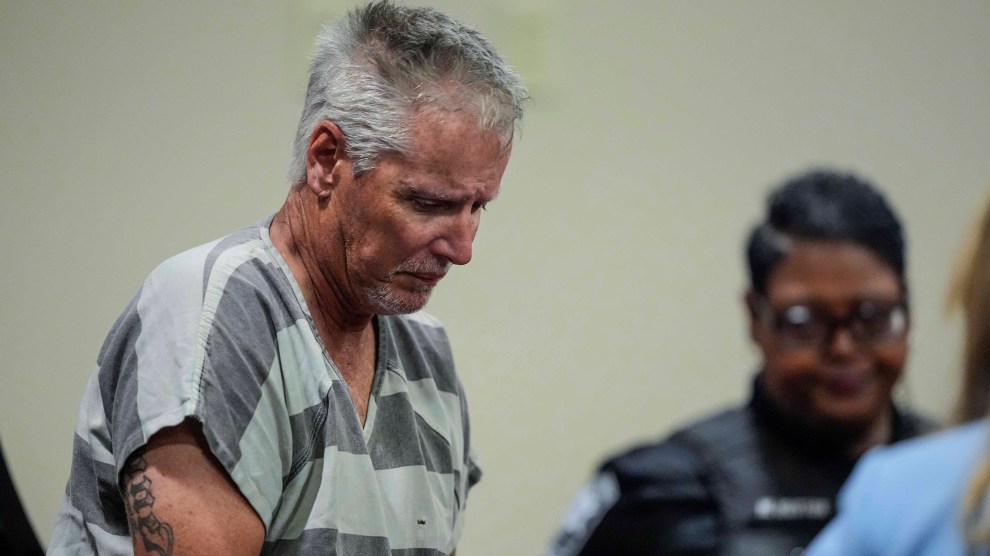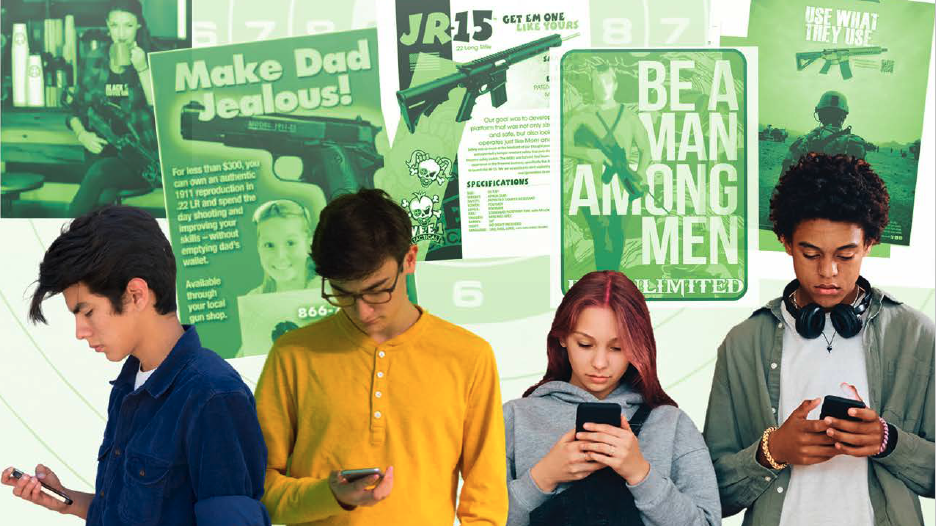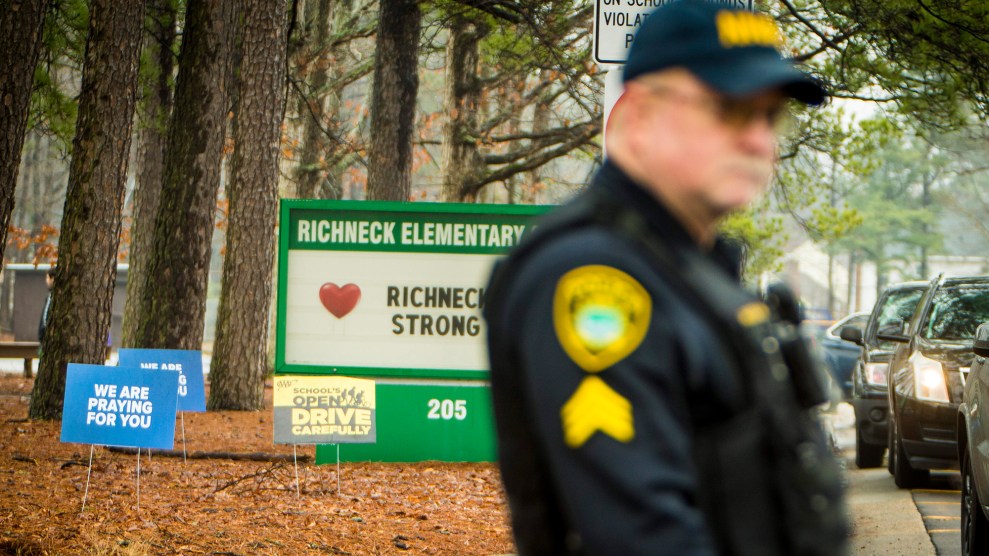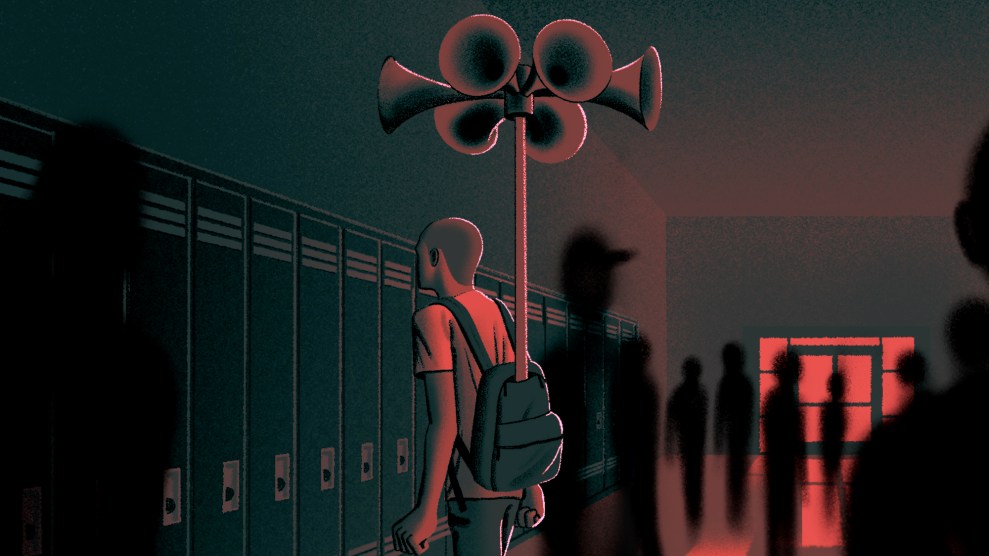
Colin Gray, 54, the father of Apalachee High School shooter Colt Gray, 14, enters the Barrow County courthouse for his first appearance, on Friday, Sept. 6, 2024.Brynn Anderson/AP
In the aftermath of the bloodshed on Wednesday at Apalachee High School in Winder, Georgia, state authorities arrested Colin Gray, whose 14-year-old son, Colt Gray, allegedly shot four people to death and injured nine others before surrendering to police. The father is charged with four counts of involuntary manslaughter, eight counts of cruelty to children—and, most significantly, two counts of second-degree murder.
The murder charges are unprecedented, the most severe ever filed against the parent of a school shooter. Late Thursday, the director of the Georgia Bureau of Investigation said at a news conference that the charges against Colin Gray are “directly connected with the actions of his son” and that the father “knowingly allowed him to possess the weapon.”
Authorities have not provided further details about evidence they may have, but according to news reports, Colin Gray owned the type of AR-15 that his son allegedly used in the attack. And Colt Gray had been “begging for months” for mental health help but had received none, according to an aunt of his who spoke to the Washington Post. (Colt Gray has been charged with four counts of murder and will be tried as an adult, authorities said.)
For more than a decade, I’ve studied and reported on the American epidemic of mass shootings. Over the past several years, and particularly since early 2024, a dramatic shift has taken shape: a reckoning for the parents of school shooters. Today, with more than 400 million guns and a lack of political will to regulate them more effectively nationwide, it may be that America has begun to find another route—a legal end-run of sorts—to bring accountability for these events of catastrophic gun violence.
The arrest of the school shooter’s father in Georgia comes just seven months after James and Jennifer Crumbley, the parents of a 15-year-old school shooter in Michigan, were convicted of involuntary manslaughter—also a first. What is publicly alleged so far about the role of Colin Gray appears to echo the case of the Crumbleys, who were found to have ignored their son’s mental health crisis and supplied him with the gun he used to commit his attack at Oxford High School, where four died and seven were injured.
The prevailing theme has long been that no one can see the violence coming, the parents included. But that theme no longer holds.
It is a near certainty that in the days and weeks ahead, more details will emerge about warning signs given off by the school shooter in Georgia, one of 20 states now requiring plans for violence prevention in public schools. School shootings are almost always preceded by such warning signs. Significant questions also loom about what may have been done regarding concerns about Colt Gray by law enforcement or the school district, after anonymous tips about threats posted online put him on the radar of the FBI and local authorities in 2023.
Another parental role—starkly different—came into public view this spring, when we published my two-year investigation, “Lessons From a Mass Shooter’s Mother,” in Mother Jones and aired a companion audio investigation on our radio show Reveal. These chronicle the experience of Chin Rodger, whose son Elliot Rodger committed mass murder in the California college town of Isla Vista in 2014. Chin Rodger hadn’t been able to recognize her deeply troubled son’s suicidal and homicidal warning behaviors, but she had gone to great lengths to get him help and care before his attack. Years later she began working with violence prevention experts at the FBI and beyond, sharing myriad details about her son’s life with them—and eventually with the public—in hopes of raising awareness about warning signs and helping avert future violence.
As I wrote in the story: “The public rarely hears from parents of mass shooters apart from brief statements of sorrow in the aftermath. The prevailing theme has long been that no one can see the violence coming, the parents included. But that theme no longer holds, especially in light of a recent tragedy that could remake the legal landscape.”
There I was referring to the new criminal precedent established with the Crumbleys—one with the potential to expand, it now appears, with the case in Georgia. The recurring mass murder of school kids and their teachers drives intense public calls for finding culpability among parents (and others), which may well be warranted in some cases. But this nascent trend of criminalizing parents is not without possible pitfalls, including, legal experts have said, for parents of minority children exposed disproportionately to gun violence.
Another notable development in the past several years has been a trend of civil liability for gun manufacturers who market their AR-15s and other firearms aggressively to America’s youth. In early 2022, Remington, the company that made the AR-15 used in the 2012 Sandy Hook massacre, agreed to a landmark $73 million civil settlement with victims’ families. In late 2022, the family of a 10-year-old victim in Uvalde, Texas, filed suit against Daniel Defense, the maker of the AR-15 used in the massacre at Robb Elementary School, accusing the company of using militaristic marketing appeals to target “young male consumers.”
The devastation in Georgia this week is far from the first to involve a shockingly young perpetrator. The shooter at Oxford High School in 2021 was only one year older, just 15 at the time. Other cases going back in time, documented in our mass shootings database and in my book on prevention, Trigger Points, have involved shooters as young as 13 and 11 years old.
In January 2023, a 6-year-old child brought a pistol to school in Virginia and shot his first grade teacher—a case in which the mother was later imprisoned for gun-related federal crimes. (The child used the mother’s unsecured firearm; her prosecution involved drug use and lying related to the gun purchase.)
What happened in Georgia this week serves as a particularly stark reminder: In America, a teenager can easily get his hands on a military-grade rifle and use it to gun down his classmates and teachers. Why we have this problem—and tens of millions of AR-15s in civilian hands—is complicated and arises from a recent history that many Americans know relatively little about.
Another reminder about this problem worth repeating is that, despite popular opinion, it is not an unsolvable one. Now, deterrence for gun-owning parents may be a growing part of a broader solution.

















